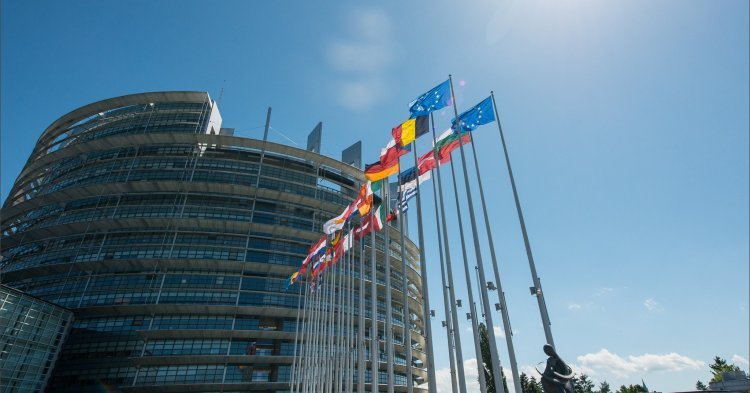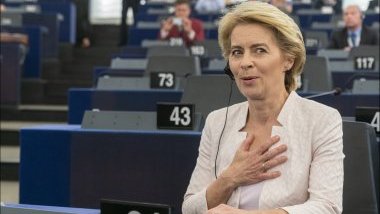Let’s start by going back to the European elections. The increased voter turnout was a massive victory for Europe, and generated a renewed sense of hope and optimism for a more transparent and democratic Europe. Against the various predictions of a significantly larger nationalist and Eurosceptic block in the European Parliament, campaigns such as JEF-Europe and UEF’s ‘I Choose Europe’ helped empower and mobilise European citizens to go out of their homes and vote for a stronger Europe, assuring them that their vote could make the difference.
The European political parties had also, like they had done in the 2014 European elections, successfully elected their lead candidates (Spitzenkandidaten) after months of engaging in their own democratic processes, which included programmes with key policy priorities, interviews and Europe-wide tours and campaigns. The lead candidate system was sold to Europe as a way to provide accountability and ensure that European citizens’ say would not only be represented in the European Parliament, but also in whoever heads the EU executive.
Yet, the European Council (EUCO) package was a surprisingly (or in hindsight, not-so surprisingly) blatant disregard of all of this, disrespecting the mandate given by the people. Apart from the fact that the entire process of deciding on the EU top jobs had been tainted with opaqueness from the start, the EUCO package includes a Commission President nominee who was not a lead candidate.
And to make matters worse, the nomination has been given to someone who not only does not have a European mandate, but also has never explained her vision for Europe – essentially, we have a nominee we know nothing about, who at the same time seemingly knows very little about the position she could be about to fill. So where did it all go wrong in just over a month?
Let us be clear, even though the lead candidate system was indeed our best chance at having a more transparent, visible and accountable process in deciding on the EU top jobs, it was only a means to an end. The process was unclear, being a mix of a parliamentary system and a presidential system; many people interpreted it according to how it would suit their interests best. However, one thing was clear – the nomination of Ursula von der Leyen and the EUCO package as a whole showed us that at the end of the day, the European Council was still able to call the shots.
There lies the fundamental weakness of the Spitzenkandidaten system: European democracy cannot be safeguarded in the intergovernmental system in which it is currently forced to operate. It has been proven, time again, that the fundamental problem with the European Council is that it allows for and encourages heads of state and government to be motivated by their own personal ambitions and national interests, even at the cost of the common European interest. Therefore, to make the European Council accountable to the will of the people, there must be some form of institutional change, one that would not only clarify the procedure for the Commission President’s election, but also institutionalise it.
And there we are again: where do we go from here? Many reservations notwithstanding, there is a window of opportunity for the federalist movement, pro-Europeans and more generally for anyone who is serious about safeguarding our European democracy. Disregarding for a moment the quote that has been making the rounds of von der Leyen claiming that she wants a United States of Europe, this could very well be our chance for a European democratic renewal.
Let us imagine a situation where von der Leyen does not manage to get a majority in the European Parliament to confirm her position and the European Council has to propose someone else. Frankly, the odds of a lead candidate being nominated would remain slim. Apart from the fact that Weber resigned from his position as lead candidate of the EPP, he never managed to garner enough support in the European Parliament or European Council.
Timmermans on the other hand was in the running for POTEC but apart from being blocked by the Visegrad four, his nomination now proves unlikely with S&D MEP Sassoli being elected as President of the European Parliament. Vestager was also in the running for the job (and would have allowed the European Council to use the same rhetoric of nominating the first woman for the position), but her nomination would now also be compromised after former Belgian Prime Minister Michel who hails from the same political party was elected as the President of the European Council... which leads us back to the same situation that we are in.
The European Parliament now wields significant power in calling the shots and should not let this opportunity go to waste. It must insist on a binding agreement calling for key, radical reforms. Namely, a reform of the lead candidate process, a fundamental reinforcement of the EU foreign, defence and security policies, and the establishment of own resources to finance common European public goods. These all combined with a renewed enforcement of the rule of law principle as one of the core values of the European project, and a reform of the EU treaties, which would provide impetus towards a truly democratic, sovereign, social and federal Europe.
Here lies von der Leyen’s first test. Will the nominee for Commission President be bold enough to be a catalyst for change towards a federal Europe, in exchange for the endorsement of the European Parliament? Or will she leave her grandchildren’s future for others to determine? In the absence of a binding agreement to the effect of the former, the European Parliament should assert itself and reject her nomination – this is the decisive role that the European Parliament now has.






Follow the comments: |
|
